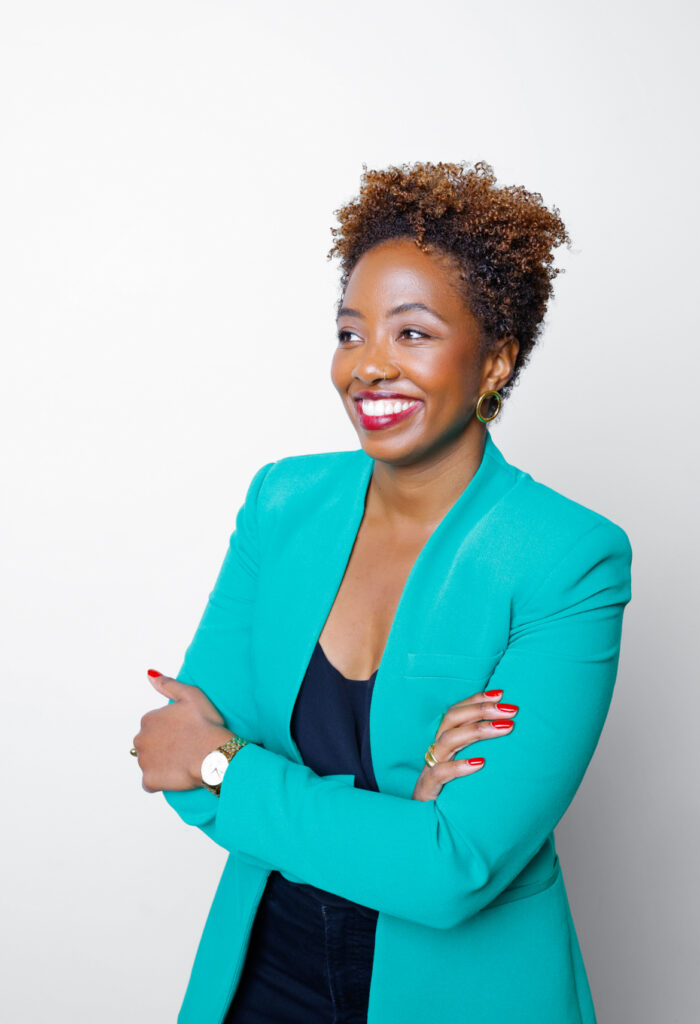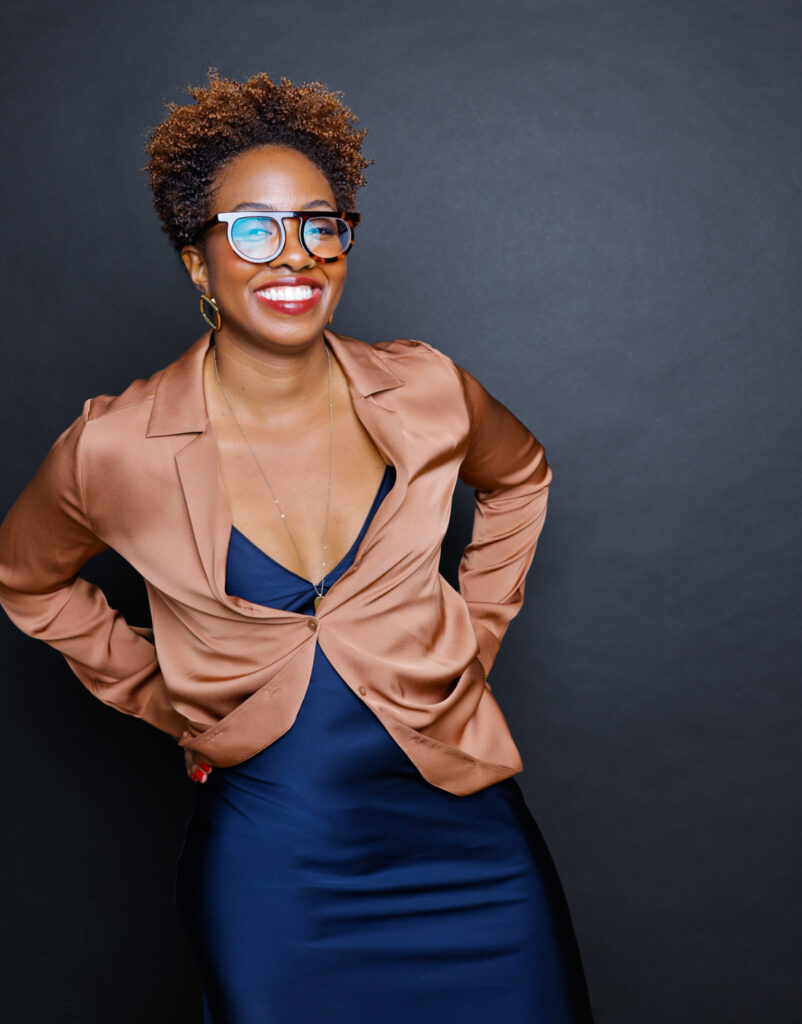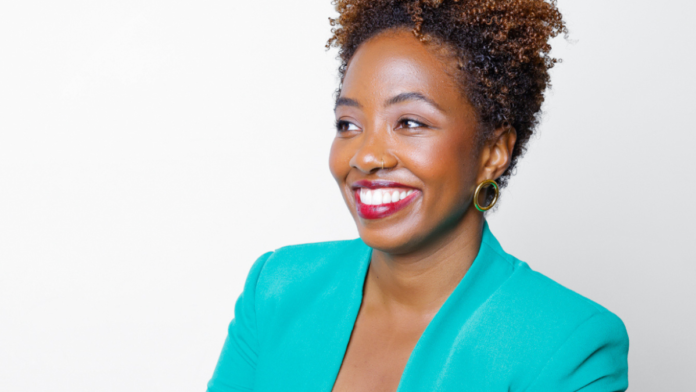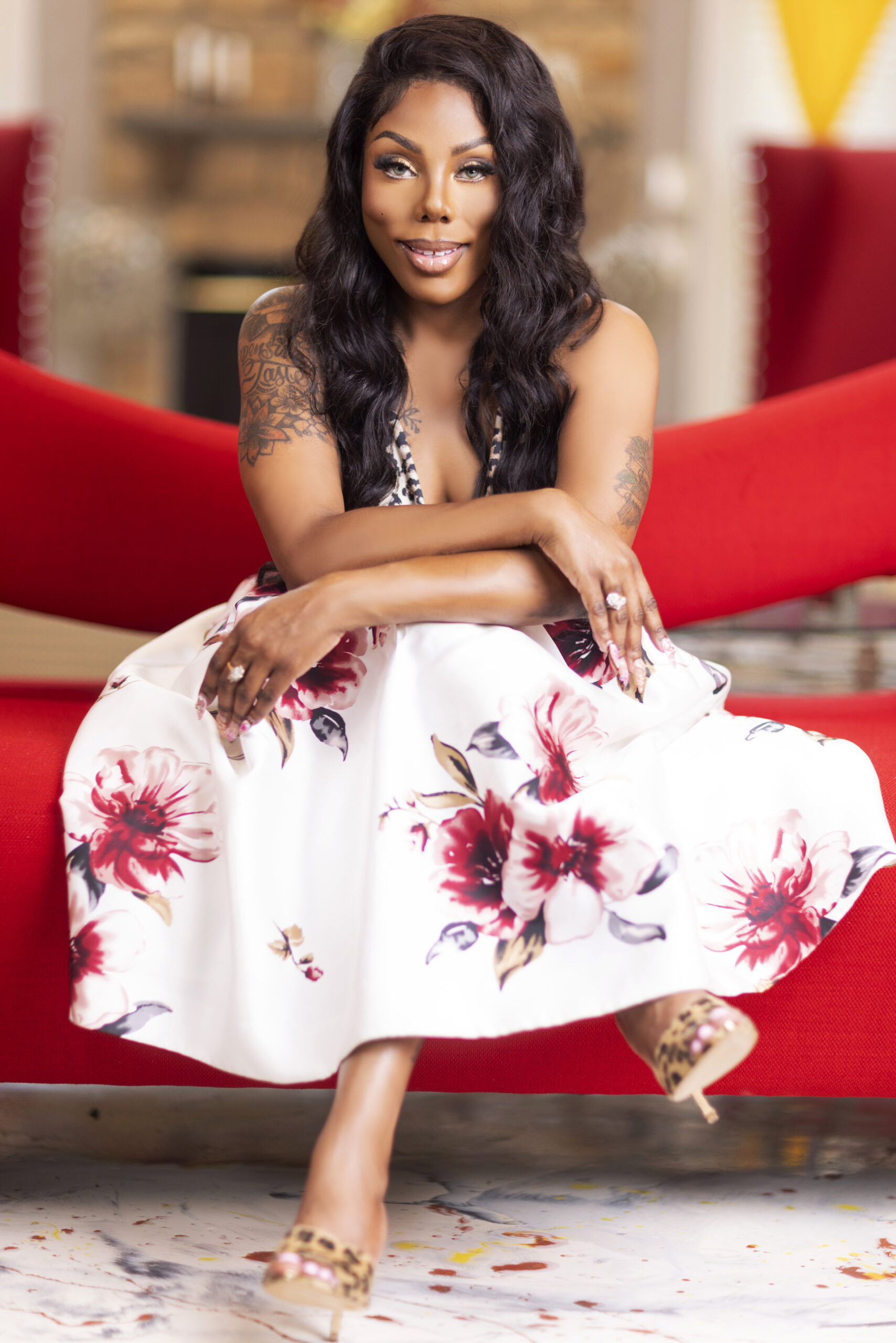( ENSPIRE Health & Wellness ) Harrison Releases The Race And Relationships Podcast Coming 2024
ENSPIRE Contributor: Gabrielle Maya
Mental and physical health are now considered a priority to help your well-being, especially in the workplace. Domenique Harrison is The Racial Equity Therapist, MPH, LMFT, LPCC. When it comes to navigating race, relationships, identity, and equity strategies, she is the ideal provider. To touch upon her accomplishments, Harrison has created curricula and facilitated national training and coaching sessions. She has worked in community care and crisis management and has Co-authored two emergency response plans for NYC and NJ.
Harrison has led educational events and planned responses to disasters, which are great for the workplace. She has organized over thirty Med Tech and Healthcare Innovation events and wrote case studies for six UN member countries on their HIV/AIDS workplace programs. Domenique Harrison is a Licensed Marriage and Family Therapist, Professional Clinical Counselor in California after moving to LA in 2017. Her education feats include a Master’s in Clinical Psychology with a Marriage and Family Therapy focus from Pepperdine University. In addition, she received her Master’s in Public Health from NYU and her Bachelor of Arts in History from Haverford College.

Domenique Harrison touches on what racial equity is, her therapy journey in mental health, the issues race and equity gaps have in our society, and how equity stems from her marriage and family therapy sessions.
Explain in your own words what racial equity is and how it correlates with our day-to-day lives.
Racial equity – to me – is the process of applying justice and truth to a global community that values you more if you are white than if you are Black, Indigenous, or a person of color. Racial equity is what we create when our racial features do not predict our life, health, experience, and death—when Black, Indigenous, and People of color are the designers and decision-makers of their own prosperous lives.
Our day-to-day lives and experiences are intricately entwined with the concept of racial equity. What we can access within our homes, educational institutions, workplaces, and broader social systems is interlinked with historical and social narratives that perpetuate the narrative: you have diminished human value if you are not of the White majority. The power of racial equity is that it evens out the scale and gives folks who have always had inherent worth what they deserve economically, socially, emotionally, physically, spiritually, mentally, and relationally.
Tell us about your therapy journey, when did you become interested in mental health as a career?
When I started my professional career, I worked in community care & crisis management, facilitating educational events and creating planning responses to disaster emergencies. I have always had a heart for community learning, health, & wellness. However, I felt so far away from the community outcomes. I never really saw – firsthand – the healing from my efforts. And I knew working directly with individuals and small groups would give me the closeness I sought.
So, I entered graduate school for clinical psychology, moved through my classes easily, and felt something was missing – specifically, discussions on oppression/race/racism, strategies and skills for effective communication and healthy relationships, and the importance of intergenerational and communal trauma and narratives. I read many more books, attended more learning workshops, and then started my work with clients and was completely overwhelmed.
There was so much trauma and stress connected to unmet relational needs, disconnection from racial, familial & community histories, people who were wounded by and numb to their bodies, and incredibly ill-equipped to talk directly and with integrity to their partners, family, and peers about their hopes and hurts. I got to a point where I didn’t want to see so many people moving through the world with little awareness, living on autopilot, and hurting themselves and others intentionally and unintentionally.
My current mission as a race and relationships therapist is to see as many people become experts at having more conscious and direct conversations that center their identities, connect their minds and bodies, and consider their history.
What do you think are the issues stemming from racial and equity gaps in all kinds of relationships?
The challenges arising from racial and equity disparities are intricately connected to what we define as white supremacy or dominant identity cultural norms. In our workplaces, educational institutions, or familial, friendly, and romantic relationships, there’s an inherent imbalance where one person often receives more opportunities, is assigned greater worth, and exists in a more resourced environment than another.
Systems of inequity, created by individuals wielding emotional, spiritual, and physical power, persist and negatively impact us today. The ramifications are profound, spanning generations and cultures, while perpetuating devastating consequences. Racial and equity gaps, in particular, contribute to, for example, more divorce in BIPOC relationships, higher poverty rates in Black and Brown communities, increased incarceration rates among Black men, elevated rates of violent trauma in Indigenous communities.
All these issues lead us to folks with more non-dominant racial and social identities to live more constricting lives—with more fear, less equal opportunity, higher rates of death & debt, increased physical and mental health challenges, lower self-esteem, greater self-shame and blame, and extreme disconnection from opportunities and experiences of positive significance.
You specialize in Marriage and Family Therapy, where do race, identity, and equity come into play?
Even before I became a therapist, issues of race, identity, and equity have always been central to my professional work. Understanding our personal and collective narratives surrounding these topics is crucial for personal growth and fostering more meaningful connections with others as partners, friends, and family members. By delving deeper into our identities, we can align our actions with our values, beliefs, and thoughts. Those who work with me gain insights into how their intergenerational histories, experiences of trauma, and relationship patterns influence their current communication and connection challenges.
Recognizing how our race and other aspects of our identity shape our access to resources, our interactions with others, and our acceptance within communities provides us with clarity on how we navigate the world and how it responds to us. Through our work together, individuals become more adaptable, mature, and purposeful in their relationships with themselves, partners, family members, and peers. It is my personal and professional mission to empower individuals by helping them embrace self-awareness and connect with their ancestral roots.
Exploring the complexities of race, identity, and equity also nurtures cognitive flexibility, curiosity, and a lifelong thirst for knowledge. It allows us to forge or reestablish connections with our heritage, communities, opportunities, family patterns, health, and overall well-being. Most importantly, it enables us to live authentically, true to ourselves. Consciously attending to matters of race, identity, and equity, we can avoid the shallowness of surface-level existence and break free from self-imposed limitations.

Explain your experience in assisting in workplace programs and educational events and how these experiences align with your mission of racial equity.
Before establishing my private therapy practice, I served as a facilitator for training sessions and workshops at a prominent Southern California university and within my consulting agency. I engaged with thousands of individuals spanning various industries, fostering discussions on self-care, prejudice, and racism in the workplace, trauma-sensitive communication, unconscious bias, racial justice in schools, resilience-informed care, emotional intelligence, professional well-being, and more.
Over time, my focus shifted from conducting standalone discussions and brief training sessions to engaging in more comprehensive, short-to-long-term partnerships with organizations. This shift allowed for a deeper exploration of their interpersonal challenges, needs, and unresolved issues related to race and identity, particularly those affecting non-dominant groups. With my current workplace programs and educational event efforts, collaboration takes precedence.
The approach centers around principles of racial equity, anti-oppression, Black feminism, and decolonization. Grounding myself in racial equity involves a commitment to centering those who have been historically silenced, disenfranchised, and undervalued for far too long.
What are the differences in your services: speaking, consulting, therapy, and weekend intensive?
I provide therapy and consulting services for race and relationships and offer speaking engagements on the same topic. I will soon introduce Therapy Weekend Intensives as well.
In Race and Relationships Therapy, my focus is on helping BIPOC and Queer Millennials, as well as mixed race couples, to become more compassionate and flexible individuals. I achieve this by cultivating a presence in mind and body, fostering authentic and direct communication, and healing racialized connections. I also enhance communication skills, explore the impact of transgenerational stories, and resolve relationship challenges.
In Race and Relationships Consulting, I assist small businesses with diverse staff eager to address unresolved conflict and increase racial awareness. I offer coaching, assessments, and listening sessions to repair racialized harm and foster healthier team interactions.
Through Therapy Weekend Intensives, I will soon offer individuals in relationships the opportunity to engage in intensive and immersive reflection, practice, and awareness building. These intensives aim to heal deep-seated wounds and inspire a curious and identity-conscious approach to relationships. Participants will develop empathy, accountability, and consciousness within their relationships.
Last, through my speaking engagements, I facilitate discussions, panels, and keynote talks rooted in curiosity, consciousness, and reflection on race, relationships, and identity.
What are some of the courses you offer, and how do they benefit couples and individuals alike?
At the moment, I don’t have any live courses available. However, we are excited to announce that Race Conscious Communication for a Healthy Relationship will be launched in 2024. Stay tuned for upcoming updates!
Besides the Race Conscious Communication Course, I’ve created the Racial Equity Therapist Presents the Conversations Deck. This conversational card deck encourages genuine discussions about our histories, social identities, and relationship dynamics.
It is a collection of three user-friendly card decks that promote healthy connections and will be available for purchase just in time for Christmas 2023! The card decks are divided into three levels of consciousness: Conscious, More Conscious, and Most Conscious.
Each deck has an instruction card, definitions, and 45-50 questions based on four topics: Care + Connection, Play + Rest, Work + Finances, and Love + Intimacy. If interested in purchasing the Conversations Deck, please visit my website or connect with me on social media @theracialequitytherapist.
I see a new course will be added very soon called Race Conscious Communication for a Healthy Relationship, what can viewers look forward to with this course?
The Race Conscious Communication for a Healthy Relationship Course integrates our individual and communal racialized understandings, fosters healthy and conscious communication practices, and dares folks to be more relationally well by standing in their integrity, taking thoughtful relational risks, and being direct with their needs rather than rely on incomplete assumptions and limiting beliefs about our racial identities and social communities. Participants will discover how to become race-thoughtful, healthy partners, friends, and family members through three pre-recorded lessons.
Lesson 1: Unveiling the Challenges of Supportive Race Conversations – delves into why discussing race and past and present racial experiences can be difficult.
Lesson 2: The Significance of Sharing Our Racial Experiences – explores the importance of opening up about our individual racial stories to foster healthy relationships.
Lesson 3: Strategies for Engaging in Great Race-Conscious Conversations – equips folks with valuable tactics for engaging in impactful race-conscious conversations with your partners, friends, and colleagues.

Tell us about your upcoming Podcast, what do you hope viewers will take with this besides all your resources?
The Race and Relationships Podcast, also known as R&R, will be launched in the spring of 2024! This project means a lot to me as I am eager to showcase vulnerability, authenticity, and consciousness when delving into the personal, professional, and communal aspects of life at the intersection of race and relationships. The podcast will be educational and conversational, with each episode ranging from 20 to 30 minutes of recorded content.
I aim to empower listeners to explore their racial, familial, and communal history and patterns of relating, encouraging them to question societal norms and expectations. Ultimately, listeners will finish each episode with greater self-awareness, a willingness to take more relational risks, and an eagerness to learn more about themselves, their families, and their racial identity.
Harrison has changed the game of counseling and helps shed light on equity and race. If interested, schedule your appointment with Dr. Harrison by visiting https://theracialequitytherapist.com/. Go follow her Instagram for updates on her upcoming Podcast and counseling services.
Related Articles: Syreeta B Paves the Way for Holistic Mental Health in the Music Industry, Keisha Saunders, LCMHC Specializes Her Mental Health Practice at Confidential Confessions Counseling










